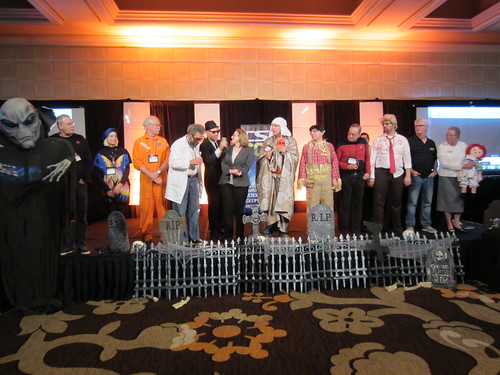She can be reached at DC.in.Detroit [at] gmail.com
Special Report:
CSICon 2016
Presented by the Center for Skeptical Inquiry
27-30 October 2016
Las Vegas, Nevada
Read DC's write-ups of CSICon 2011, CSICon 2012, and Reason for Change 2015
Full conference schedule can be found here.
6 days, 4 magic shows, 3 buffets, 187 vodkas (priced $4-$12 depending on what end of the strip — and sometimes which side of the room — I was on), two equestrian events, 30+ speakers, and one Banachek. There’s my CSICon 2016 summary.
CSICon is something I look forward to every fall. Because I am an exceptionally hard and devoted worker, I had vacation time to spare and so decided to go out to Vegas a day before the con itself kicked off. Ever wonder what it’s like in the lobby/casino of a Vegas hotel at 8:30am on a Wednesday? It’s just as you think: sad souls chain smoking and robotically plunking quarters into soulless machines, tired tourists dragging overpacked bags behind them at the end of an extended weekend, bleary-eyed businessmen living in the same suits for three days, wringing out any remaining hours before rejoining the real world… Yep, everything I remember about Vegas!
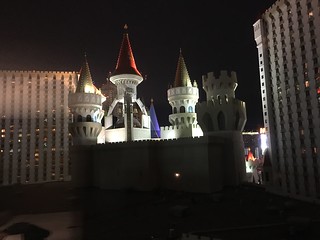 |
| Yes it's cheesy, and I love it. |
I’m a fan of magic/comedy magic (different things!) so my priority was to find a good Wednesday show. I’ve seen the unmissable Mac King (who is marvelous, and you should go see him) and my beloved Penn & Teller were out of town that week, so was looking for another option when I saw the headline for “the World’s Best Mentalist” doing a show called Paranormal: the Mind Reading Magic Show. The skeptics credo is “let me see for myself,” so of course I was going to see that. I mean, he’s the world’s best!
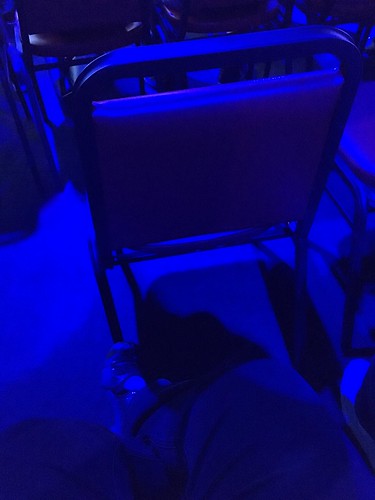 |
For an extra $20, I could have had that VIP seat experience.
|
Da Silva did a favorite of mine, a routine I later learned is called “invisible touch.” When I saw him setting up for that, I was really mad I didn’t grab that frisbee out of the air. Next time…next time.
After the show, I walked the strip for a good long while (I love wandering in and out of all the casinos), went back to the room to refresh, and then back out into the city for some local-flavored activities that fall into the “what happens in Vegas” category.
Getting a car back to my hotel, I realized I’d been here one day and I’d spent all my money and had been up for 24 hours. This was going to be some week.
Thursday morning I took advantage of my last opportunity to sleep late, before coming to con registration at about noon. CSICon people are easy to spot, don't ask me why — maybe that twinkle of curiosity in their eyes. There were a good number of attendees already, which was a good sign for a lively con. As was the fact that the pre-conference workshops had sold out. I was sorry to miss Ray Hyman’s cold reading talk: that man is a treasure.
The con began in earnest Thursday night with opening remarks and a welcome reception. The mood was buoyant, and I saw a lot of familiar faces — not just on the speakers/organizational side, but other attendees that I’ve seen over the years, and even well-known skeptical writers/speakers/activists who were simply there as audience.
The reception led into my second magic show of the week, this time by close-up/card specialist Jamy Ian Swiss. With the Da Silva show still fresh in mind, I thought if Swiss so much as looked in my direction for a volunteer, I was going to fix him with such a laser beam, he couldn’t not pick me.
Midway into his show, he was doing card predictions, which he claims are given away by “tells,” and he came right to me and asks my name. “Do you play cards?”
“Actually no, I don't.” That's the truth. It's like I'm pathologically incapable of not telling the truth, even to someone whose job it is to “lie” to me.*
So he moved on to someone else.
Later, Swiss picked the man sitting next to me for another trick. This guy was in town for an actuarial convention that happened to abut this one, and being hep to the scene, chose to stay a few more days. Swiss spotlighted him and asked “do you believe we can know the future?” I laughed and wondered how Bill the actuary would answer that. He said no, which launched an impressive card trick which culminated in Swiss having Bill’s card embossed in gold on his own wallet. When Bill returned to his seat next to me, with the deck of cards Swiss had given him, I watched as he carefully went through the entire deck, looking for clues. I'd have done exactly the same thing. When I ran into him later at an Excalibur bar, I asked “it was a force right? Have you figured out the force?” He said “I've been thinking about that this whole time.” Of course he had. I would, too.
The first full day of talks started bright and early at 8:30 Friday morning with emcee George Hrab’s opening remarks.
The 9:30 speaker, Maria Konnikova speaking on Confidence Games, told us about a man in London who would tell people he needed gas money to get to his daughter who was in the hospital with cancer, and she asked, “What are you going to do, ask for medical records? You're going to help him because you aren't a monster.” Well, no sorry I wouldn't help him. Not because I'm a monster, but because I know bullshit when I smell it. We may be Midwest Nice in Detroit, but we’re no suckers, and I hear this story every time I stop for gas inside the city limits.
The remainder of the morning talks were largely about medicine and misinformation. Just because someone claims to be using “science,” doesn’t mean they are. Science isn’t a monolith or even a thing you can hold in your hand. It’s a methodology, which means there is such a thing as bad science.
At the 2pm talk, Ron Lindsay spoke on “hard” and “soft” targets, and why skepticism matters. There are those who think skeptics waste a lot of time on the “soft” targets — ghosts, ESP, aliens, homeopathy, etc. — and come away asking “Who cares? Everyone knows there’s no such thing as Bigfoot!” Lindsay argues that “controversial” doesn't mean controversial among scientists — they know homeopathy doesn't work — but controversial among the public. Some make the mistake of thinking that scientific consensus makes something non-controversial and therefore a “soft target.” Homeopathy makes billions. It's unregulated. This is a hard target. Why does it matter if people believe in ghosts? Because it's an indicator that they will have a lack of critical thinking in other areas as well. Believing in ghosts leads to climate denial and 9/11 Truthers.
I’ve long been a fan of Lindsay’s talks and hope that he won’t disappear after officially stepping own from his office at CFI.
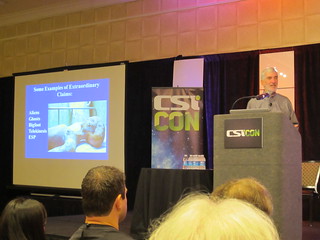 |
| “Promoting analytical thought reduces the likelihood that people will rely on intuitive thinking. Ignoring extraordinary claims tolerates vandalism of critical thinking.” — Ron Lindsay |
The day’s talks officially ended with Kevin Folta, ostensibly speaking on GMOs, which turned out to be one of my favorites of the entire weekend. The talk began by reasserting that we have been modifying plants and animals for our own purposes from the beginning (the horror of genetic modification!), but was ultimately about how important science communication is, and how difficult — downright devastating — it can be to speak unpopular truths.
“The gap between innovation and application isn't technology. It's communication. Scientists and farmers need to talk to people the right way.”
Even after having 27,000 of his emails FOIAed by anti-GMO sectors in an attempt to smear him and keep him from educating the public, Folta (professor and chairman of the horticultural sciences department at the University of Florida) still asserts, “Lead with your ethics.” When communicating sensitive topics, most won't be swayed by facts. They need shared values.
Folta’s name (and google results) still suffer from anti-science attacks, but he continues doing work he believes is important. For me, this joins Bruce Hood’s work busting bogus “bomb detecting” devices as highlights of real-world, lifesaving work done by people who critics like to claim just go around telling people they’re wrong.
Inspiring.
By evening, I’d had lively chats with people from Idaho, Texas, England, Australia, and Ireland. The Irish fella was a random guy who noticed my con badge as I was walking through the casino and asked me about it. Turns out he's a magician, so this was of much interest to him. He also works at Dick's Last Resort and invited me to come see him, but I had to admit I was afraid to because I'm here by myself and didn't think I could take the abuse they were sure to heap on me. He grimaced and said “yeah...they might.”
The Friday night featured talk was Richard Dawkins in a 90 minute conversation with Jamy Ian Swiss. Dawkins gets the standing O, as he always does, and deserves.
And then was the Vegasy of the official CSICon events, the Tournament of Kings dinner, inside the Fun Dungeon at the Excalibur.
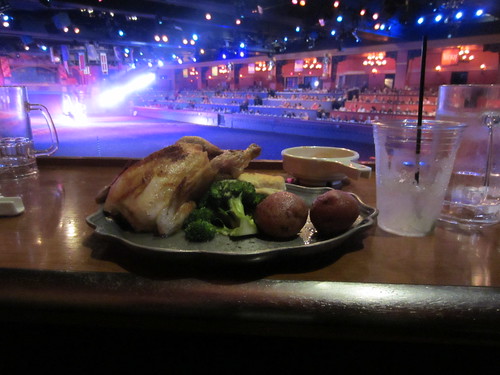 |
| Seriously, I have no idea how to eat an entire bird. Like an apple? |
After dinner, the Balles Prize in Critical Thinking was awarded to Vox columnist Julia Belluz, who marveled that she completed grad school without ever really being educated in critical thinking, and spoke movingly on the importance of training “BS detectors” early so Dr Oz never even happens.
Friday wrapped with another magic performance, this time by mentalist Banachek.* To my delight and frustration, he performed the exact same “invisible touch” routine that I’d seen Da Silva do two days earlier. And again I was not chosen!
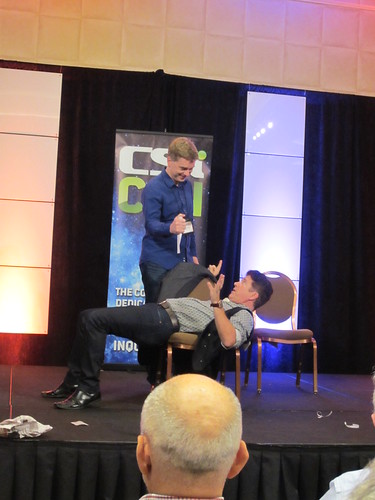 |
| I would have had to excuse myself from this routine. There's no way I'm stabbing this guy, no matter how much I know it's a "trick." |
After the show, the night owls poured down into the lobby bar at the Excalibur, trading TAM stories, science puns, and variously watered-down drinks. While talking to two very energetic con-goers, I noticed Banachek at the edge of the room and said to one of the women, “Boy, I’d love to get inside that man’s mind.” Like a practiced wingman, she grabbed me by the hand, walked me over to him and announced, “Hi, this lady would really like to talk to you.”
I’m no fangirl (as I’ve said here time and time again, usually followed by a big juicy BUT), but… when Banachek turned those pale green eyes on me, I had…nothing. No, that’s not true. What I had was “how on earth did you know that guy’s childhood dog was a dalmatian?” But that’s just gauche. Once I repressed that question, I told Banachek about the other mentalism show I’d seen and how they’d both done the same “invisible touch” routine.
“Did you know I invented that bit?” he asked me. What! Of course he did! “How did Da Silva perform it?”
“Pretty much just like you did, except somehow not quite as good. I want to be part of that bit so much. That’s one of those ‘I want that to happen — or not happen — to me’ situations,” I told him. “But as someone else mentioned, you were probably looking for a certain type of person for that routine, and I know I have the don’t ask me look about me.”
He fixed me evenly and said, “Oh I’d have used you.”
“Well shit, now you can’t, because we’ve talked about it!”
No no, he still can. And I’m going to see every Banachek performance I possibly can, until he does, goddammit.
Jamy Ian Swiss joined us, and we talked for a couple of hours on topics as varied as show business, animal rights, politics, NLP (which both men agree is bunk), and some insider info that the two magicians tried to share over or around me. We also touched on “soft” and “hard” targets in skepticism, Swiss and I agreeing that we dig the soft targets — more lake monsters! Bigfoot skepticism is where it’s at!
As much as I hated to do it, I eventually had to excuse myself from the two gentlemen to turn in for the night. Imagine that, I wasn’t the last one to leave for once. This is the real magic of CSICon.
The talk I was most interested in that morning was Stuart Vyse on “brain training,” e.g. Lumosity, BrainHQ, and Cogmed. If you’re a person who enjoys using your brain, you’ve probably found the (relentless) advertising quite tantalizing. I know I have, but I haven’t put in the work to double-check the claims. Turns out, Lumosity settled a false advertising charge with the FTC for $2 million. Well, that’s not a good start. Part of the difficulty of testing a service like Lumosity is how do you design a placebo? Either you’re doing a puzzle or you aren’t doing a puzzle. If you’re just sitting there staring at the tester, I think you might guess you’re in the placebo group.
Unfortunately, the short answer is there is no compelling evidence for real world cognitive benefits of these “brain training” programs. At the same time, if the choice is brain training or TV, do the brain training. On the other hand, if the choice is between brain training or playing with your kids, cooking, going for a walk with a friend...you'll get more benefit from the latter.
The rest of the morning’s talks focused on refining your own BS detector, and knowing how to find out for yourself. If there’s one thing skepticism really comes down to, it isn’t “debunking,” or being smarter than, or even just science: It’s critical thinking. Critical thinking and realistic evaluation benefits us all. Speaker David Helfand pointed out, “A selfish person will outcompete an altruistic person, but a group pf altruistic people will outcompete a group of selfish people — because they will share information.” That's how important it is.
Our 2:30pm speaker, Elizabeth Loftus, is another notable who years ago changed the way I personally think about memory, and provides many of my arguments regarding the unreliability of eyewitnesses. It's shockingly easy to intentionally distort someone's memory, as tests have shown again and again. Is there any way to tell the difference between a true memory and a false one, from the inside? We are equally emotional about both of those things, and people with “superior” memories are as susceptible to memory distortions as people with average memories. It’s important to point out that these aren’t the same as lies. Because something is not true, it doesn’t mean it is an intentional deception.
One take home message: “Just because someone tells you something confidently, with detail, and emotion, it doesn't mean that it really happened. You need independent corroboration.”
Programming closed with James Randi in conversation with Kendrick Frazier. There are few people who have done as much to promote, well, REALITY as James Randi. He deserves all the accolades and ovations he gets, and you don’t need me to go on about it.
And then the part I especially look forward to at CSICon: The Halloween party!
I love it when people customize their costumes for this event. You aren’t going to see a homeopath, a plague vector, the Warrens, or the Pope of Atheism at your neighborhood costume contest, I can tell you that. As a prior grand prize winner, my heartfelt congratulations to our Straw Vulcan 2016 champion.
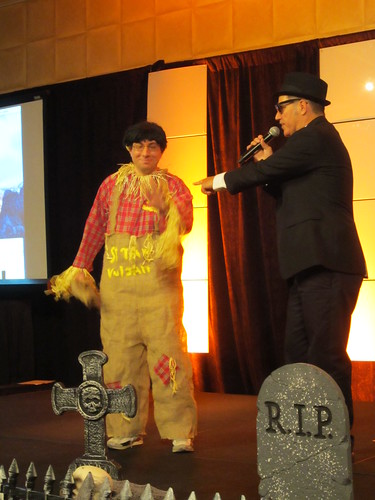 |
| Sorry, I'm a writer, not a photographer. |
I expected a weak crowd for post-party early Sunday, but that’s because I’d forgotten that the morning’s first talk was by favorite Lawrence Krauss. The room was as full as it had been all weekend. “Gravity is the weakest force in the universe. Except, to those who amazingly made it this morning, it didn't seem so weak,” Krauss joked.
On physicists with competing hypotheses, he described how they dutifully performed the experiments, sharing and comparing the data. “They didn't care who was right, they cared what was right. And that's science at it's best.” Krauss’s enthusiasm is always inspiring. Another standing O.
The con finished up with the traditional Sunday Papers, six quickie 15 minute presentations on creationism vs genetic algorithms, RH-negative blood types, homeopathy on trial, predicting pseudoscience, evaluating education for critical thinking, and chemtrails.
Sound like fun? You bet it was fun. In the way that trying to cram another week’s worth of clothing into a full suitcase is fun! So much good information presented by so many earnest scientists, lawyers, activists of all sorts.
George Hrab closed the festivities, exhorting us to “let this weekend be the thing that charges your skeptical batteries. Remember there are people on our side.”
CSICon 2016 Vegas had a different overall character than the previous I’ve attended, both in the general theme and the literal characters. The talks were by and large of a serious scientific bent, while remaining interesting, and at a 30 minute maximum, succinct (with no time for meandering Q&As — I like Q&As, but people tend not to use them well). I’m sure the overall subject matter was influenced not only by the increasingly bizarre political climate and pervasive anti-science/intellectualism momentum in the US, but by CSI’s commendable attempts at not having the same speakers at every event.
This means that next year’s CSICon is just full of mystery. Where will it be? Who will be speaking? Will it even happen in 2017? Just what is going to take the costume contest next year? (I'm already working on mine.)
But there’s one question that you and I both already know the answer to: Wherever, whenever, and whatever, you can bet your girl DC will be there to tell you all about it.
*Let’s be clear on this. Swiss and Banachek are two of the “good” guys in magic, who will tell you that what they do isn’t magic or psy or ESP. As Banachek says, he wants to look psychic, but he doesn't claim he is. In fact, he said he wishes Da Silva would include a disclaimer that says as much. They “lie” to us by telling us that what they are doing isn’t real, and then doing it right in front of you in ways that are indistinguishable from magic. This is why they are invited to play a room full of skeptics — we know what they are doing, and we still can’t see what they are doing. Never let anyone tell you skeptics think they know everything. Spend 10 minutes with either of these guys, and you’ll know you don’t know jack.



